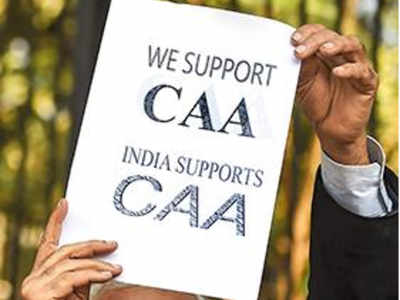- News
- India News
- Citizenship seekers may have to prove faith
Trending
This story is from January 28, 2020
Citizenship seekers may have to prove faith
Migrants or refugees from Pakistan, Bangladesh and Afghanistan need to prove they belong to one of six minority faiths — Hindu, Sikh, Christian, Jain, Buddhist or Parsi, said a government functionary. No documents may, however, be sought to establish that the applicant came to India on account of religious persecution back home.

A lawyer during a pro-CAA rally in Mumbai
NEW DELHI: The Citizenship Amendment Act (CAA) rules, being given final touches, are likely to require eligible migrants to furnish documents establishing country of origin, date of arrival prior to the cutoff and religious identity while there won’t be any need for proof of religious persecution.
Migrants or refugees from Pakistan, Bangladesh and Afghanistan need to prove they belong to one of six minority faiths — Hindu, Sikh, Christian, Jain, Buddhist or Parsi.The documents recording religion of migrants applying for Indian citizenship under CAA must pertain to the period prior to December 31, 2014, a senior government functionary said.
The functionary added no documents may, however, be sought to establish that the applicant came to India on account of religious persecution back home. “The ground of religious persecution includes fear of religious persecution as well. So, no documentation may be necessary,” the functionary said.
Sources indicated that the CAA rules may not allow the state administration much role in processing applications. “State and local administration’s role will be minimal. While the application process will be entirely online, a central authority may be designated in the states to process claims,” a source said.
Indications are that documentation requirements for citizenship applications under CAA may extensively borrow from existing long-term visa policy for migrants belonging to six minority faiths in Pakistan, Bangladesh and Afghanistan.
Any document issued by the governments of Afghanistan, Bangladesh or Pakistan or from any government authority or agency clearly showing the religion of the applicant — like a school certificate for example — can be furnished to establish membership of minority community.
Similarly, citizenship of the applicant for long-term visa can be proved by furnishing documents such as copy of the old passport or any other document issued by government authorities or agencies in these countries such as birth certificate, educational certificate by board or university, certificate of enrolment and study in schools, government-issued license, land and tenancy records.
Documents to prove the date of entry of long-term visa applicant into India include slip issued by census enumerators in India to such persons while conducting NPR prior to December 31, 2014, insurance policies issued by companies in India, bank and/or post office account, court and tribunal records in India, government-issued licence and land and tenancy records, permanent residential certificate, document showing service or employment, gram panchayat secretary certificate and Aadhaar card (all issued in India).
Migrants or refugees from Pakistan, Bangladesh and Afghanistan need to prove they belong to one of six minority faiths — Hindu, Sikh, Christian, Jain, Buddhist or Parsi.The documents recording religion of migrants applying for Indian citizenship under CAA must pertain to the period prior to December 31, 2014, a senior government functionary said.
The functionary added no documents may, however, be sought to establish that the applicant came to India on account of religious persecution back home. “The ground of religious persecution includes fear of religious persecution as well. So, no documentation may be necessary,” the functionary said.
Sources indicated that the CAA rules may not allow the state administration much role in processing applications. “State and local administration’s role will be minimal. While the application process will be entirely online, a central authority may be designated in the states to process claims,” a source said.
It was pointed out that CAA rules are likely to incorporate the suggestion made by Assam government for a short, time-bound application window for Bangladeshi migrants in the state.
Indications are that documentation requirements for citizenship applications under CAA may extensively borrow from existing long-term visa policy for migrants belonging to six minority faiths in Pakistan, Bangladesh and Afghanistan.
Any document issued by the governments of Afghanistan, Bangladesh or Pakistan or from any government authority or agency clearly showing the religion of the applicant — like a school certificate for example — can be furnished to establish membership of minority community.
Similarly, citizenship of the applicant for long-term visa can be proved by furnishing documents such as copy of the old passport or any other document issued by government authorities or agencies in these countries such as birth certificate, educational certificate by board or university, certificate of enrolment and study in schools, government-issued license, land and tenancy records.
Documents to prove the date of entry of long-term visa applicant into India include slip issued by census enumerators in India to such persons while conducting NPR prior to December 31, 2014, insurance policies issued by companies in India, bank and/or post office account, court and tribunal records in India, government-issued licence and land and tenancy records, permanent residential certificate, document showing service or employment, gram panchayat secretary certificate and Aadhaar card (all issued in India).
End of Article
FOLLOW US ON SOCIAL MEDIA











